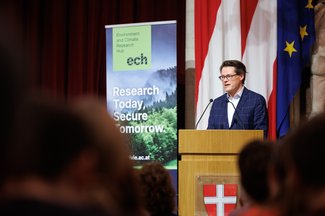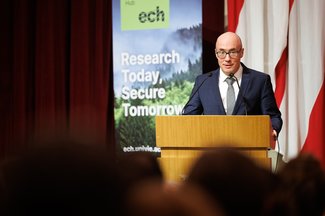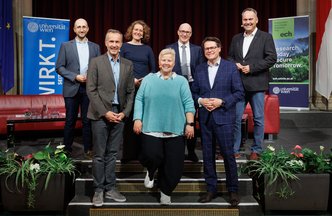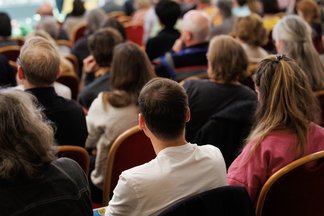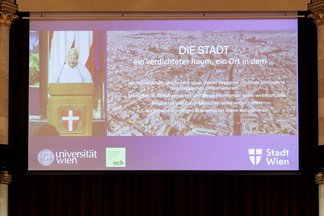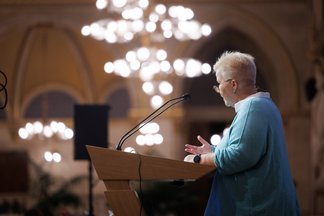Science, Politics and Society in Dialogue for a Sustainable Future
How can we move from knowledge to action on climate issues? This question is being addressed by the Environment and Climate Research Hub (ECH) in cooperation with the City of Vienna in its lecture series "Environment, Climate, Sustainability: From Knowledge to Action". What lies behind this topic and how science and administration can work together towards a sustainable future was also the subject of the opening event for the lecture series in the ballroom of Vienna City Hall on 13 October.
With around 350 visitors, the public lecture series “Environment, Climate, Sustainability: From Knowledge to Action” was opened on October 13, 2025, in the ballroom of Vienna City Hall.
The series is a collaboration between the Environment and Climate Research Hub (ECH) at the University of Vienna and the City of Vienna. In the 2025/26 winter semester, it will focus on the question of how scientific findings can be translated into concrete approaches for sustainable and climate-friendly urban development.
The lecture series is open to the public and aims to promote dialogue between science, administration, and urban society.
Watch the event on Youtube:

“Vienna must reinvent itself”
“Vienna must completely reinvent itself in order to achieve this transformation. We must take action to ensure that Vienna remains a good place for everyone,” emphasised City Councilor for Climate Protection Jürgen Czernohorszky in his opening speech in the ballroom of Vienna City Hall. In front of numerous guests, he explained that climate protection and social cohesion can only succeed if science, administration, and civil society work together to find solutions. Open exchange between these areas is crucial for the sustainable and socially just development of Vienna.
The University of Vienna as a partner for climate action
In his speech, Nikolaus Hautsch, Vice Rector of the University of Vienna, focused on the university's responsibility to actively participate in social transformation processes: “It is an absolute duty for the University of Vienna to lead the way and to keep in mind the urgency of the threats posed by climate change, biodiversity loss, and environmental pollution.” Climate protection can only work if there is broad social support, he said. Many graduates of the university act as “multipliers” in politics, business, and civil society - an important contribution to putting scientific findings into practice, Hautsch continued.
In this context, the Vice-Rector praised the ECH as a central interface: “The research hub makes an essential contribution to integrating the university's goals into the city and society.”
“From knowledge to action” - science as a beacon
Thilo Hofmann, environmental scientist and co-director of the ECH, reported that over 500 people had registered for the lecture series and was delighted with the interest in scientifically based exchange on environmental and climate issues.
“We know a great deal about the climate crisis,” Hofmann continued, “but the challenge is to translate this knowledge into action.” In line with the ECH's philosophy, he advocated for transdisciplinary and interdisciplinary perspectives, as complex environmental issues can only be tackled through the interaction of different disciplines. At the same time, he emphasised the importance of communicative scientific practice: science must convey its findings in a way that is understandable and application-oriented. “Science is not an ivory tower - perhaps more like a lighthouse that can provide guidance.” Dialogue with politicians and administrators is central to this: “We are interested in constructive exchange with the City of Vienna and its residents – not in lecturing, but in finding common solutions.”
The city as a laboratory – between innovation and failure
Ulrike Felt, ECH member and science and technology researcher at the University of Vienna, opened the lecture series with her keynote speech “The City as a Laboratory - On the Trail of (More or Less) Successful Climate Policy.” She focused on the city as a densely populated space – as a place “where history has happened and the future is being written.” According to Felt, cities have always been special because they are places where people, technology, and society interact closely. Especially today, in times of increasing ecological and social tensions, cities are becoming a magnifying glass for the challenges of a sustainable future.
Felt highlighted the need for close cooperation between science, society, and political actors - even when “things get rocky.” According to her, this friction is essential for shaping climate policy in a constructive and realistic way. Cities are therefore ideal laboratories in the best sense of the word: spaces for experimentation where different interests, perspectives, and innovative approaches come together.
Felt used three examples from Vienna to illustrate the ambivalence of urban climate policy. Seestadt Aspern, for example, is one of Europe's largest urban development projects and stands for innovation and sustainability – but at the same time, it raises questions about technological dependence and resource consumption. “Smart” does not automatically mean sustainable, according to Felt, because digital infrastructures also generate high energy consumption and digital waste.
The trend toward urban gardening can also be interpreted in two ways: as a social innovation that raises awareness of environmental issues, but also as an instrument of urban environmental policy. The ecological effects are minor, but the social effects are considerable, as people are becoming more sensitive to environmental and climate issues - which can also be seen as a form of success.
Felt took a particularly critical look at municipal plastic recycling. She pointed out that recycling processes are often inefficient and energy-intensive, and that a significant proportion of the plastic collected is incinerated, landfilled, or exported. Recycling often serves as an “excuse” to continue consuming large amounts of plastic. “When we recycle, we intervene at the end of the cycle and try to repair the damage that has already been done – but we really need to start at the beginning, for example with the manufacturers,” said Felt.
In the end, the technology and science researcher asked the crucial question: “What does success in environmental and climate policy actually mean?” Not every action taken can be measured by short-term results, according to Felt. Knowledge also arises through error, adaptation, and revision. “We learn not only from successes, but also from a bit of failure,” Felt summed up. Failure is not always a step backward, but can be a prerequisite for insight and further development. Environmental and climate policy must therefore be conceived in a broad, transdisciplinary manner and with a willingness to change course.
Panel discussion: Cooperation as the key
In the subsequent discussion, moderated by Marlene Nowotny (Ö1), Katharina Rogenhofer (KONTEXT Institute for Climate Issues), Andreas Januskovecz (Climate Director of the City of Vienna), Ulrike Felt (University of Vienna), and Thilo Hofmann (University of Vienna) discussed the conditions necessary for successful climate policy.
Rogenhofer pointed to the role of civil society movements such as Fridays for Future, which raised public awareness of climate issues in 2018 – saying that while unfortunately, there is not as much talk about it today, people are generally more sensitized to the issue. Rogenhofer subjected current political narratives to thorough criticism: “The focus must be not on sacrifice, but on the added value that I gain from climate-friendly actions.” Sustainable action must become easier and more attractive - this can be implemented in a clear and tangible way, both socially and economically, especially in a city like Vienna.
Andreas Januskovecz, Climate Director for the City of Vienna, recalled historical milestones in Vienna's environmental policy: the construction of the Hochquellenwasserleitung (high-altitude water pipeline), the reforestation of the Vienna Woods, and the creation of the Danube Island as flood protection. These projects are beloved today but were highly controversial at the time they were conceived. His conclusion for the present: “Transformation can only succeed if cities, science, business, and citizens act together.”
Scientists Ulrike Felt and Thilo Hofmann emphasised that sustainable change is only possible through continuous cooperation beyond political election cycles. At the same time, they believe that science also has a responsibility to actively seek dialogue with politics and society - and to communicate its findings in such a way that they can be incorporated into decision-making processes and social action.
Outlook: Learning to talk to each other
This dialogue between science, politics, and society is precisely what the lecture series “From Knowledge to Action” is dedicated to, explained Timo Bühler, ECH coordinator and organizer of the lecture series. The aim is to strengthen exchange and identify new paths for joint transformation. With 33 speakers from 14 universities and institutions and over 500 students from 70 fields of study, the lecture series is already one of the University of Vienna's largest public courses in the field of environment and sustainability.
Information and participation
The lecture series “Environment, Climate, Sustainability: From Knowledge to Action” will take place in the winter semester 2025/26 and is open to the public. It is aimed at students, city dwellers, and anyone interested in climate and environmental issues in an urban context.
More information and the complete program here
